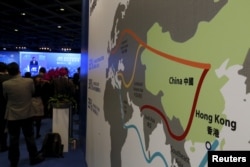China announced Tuesday that 28 countries will send their heads of government to an international conference on the One Belt, One Road (or OBOR) program to be held next month in Beijing. However, only six G-20 countries are on the list, and government heads in most of the developed world will not attend.
Italy is the only major western country sending its head of government to the conference on the development plan, despite China's effort to give it an international flavor.
Four influential personalities will attend the event at the highest level. Those are Russian President Vladimir Putin; Italian Prime Minister Paolo Gentiloni; Christine Lagarde, managing director of the International Monetary Fund; and Chinese President Xi Jinping, who will inaugurate the conference.
"This is an economic initiative and it deals with economic cooperation, so we do not want it to be politicized," Chinese Foreign Minister Wang Yi said in reply to a question about whether the Western world was not showing much interest because it had doubts about China's motives.
France and Germany have major elections around the time of the Belt and Road Forum, to be held May 14-15. However, they have agreed to send senior officials.
"This is an economic cooperation forum, an international cooperation platform that everyone is paying attention to, supports and hopes to participate in," Wang said. He said representatives of 110 countries, which include those that are not on the OBOR route, would attend.
A problem of plenty?
China has also signed documents with 56 countries to enlarge support for the program. It has allocated an initial amount of $40 billion for a Silk Road Fund to implement OBOR.
"The contours of OBOR are vast, and its ever-expanding nature has created plenty of discrepancies," Jonathan Hillman, director of the Reconnecting Asia project at the Washington-based Center for Strategic and International Studies, told VOA. "For example, some infrastructure projects announced years earlier are now covered under the OBOR banner."
British Prime Minister Theresa May was widely expected to attend as part of her efforts to strengthen Britain's business and diplomatic links with China in the post-Brexit era. Instead, she is sending British Chancellor of the Exchequer Philip Hammond in her place.
For China, OBOR is an important model to expand political influence while enhancing its infrastructure construction business and exporting its industrial overcapacity. Beijing is also projecting the program as a "win-win solution" to the problem of inadequate infrastructure in developing countries, and economic slowdown in the developed ones.
Guest list
Most of the presidents and prime ministers attending the forum are from countries that have received or expect to obtain financial support from China. They include Greece, Belarus, Pakistan, Philippines, Sri Lanka, Cambodia and Ethiopia. Russia depends heavily on business deals, including a 30-year gas supply contract that it has entered with China.
China has done well in persuading most of the countries linked to the South China Sea dispute, including Vietnam, Indonesia, Malaysia, and Philippines, to send their leaders. Seven of the 10 members of the Association of South East Asian Nations are sending the heads of their governments.
China did not distinguish between developed and developing countries, and regarded all as equal members of the international community, Wang said, as one of the goals of the Belt and Road program was to promote equitable development between rich and poor nations.
Recoining a name
Wang dropped the word "one" from the original name of the program, One Belt, One Road. Observers said China is trying to avoid the impression that it wants to control the increasingly international program, and make it a consultative process.
On the other hand, several countries in China's neighborhood — including Japan, South Korea, India and Singapore — have not yet agreed to send their heads of government. Three of China's colleagues on BRICS — Brazil, India and South Africa — are not sending their heads of governments, according to the list released by the Chinese foreign minister. The other two members of BRICS are Russia and China.
"Unsustainable debt is a real concern for certain countries," Hillman said, referring to concerns that expensive infrastructure projects under OBOR can push economically weak countries deeper into debt.






